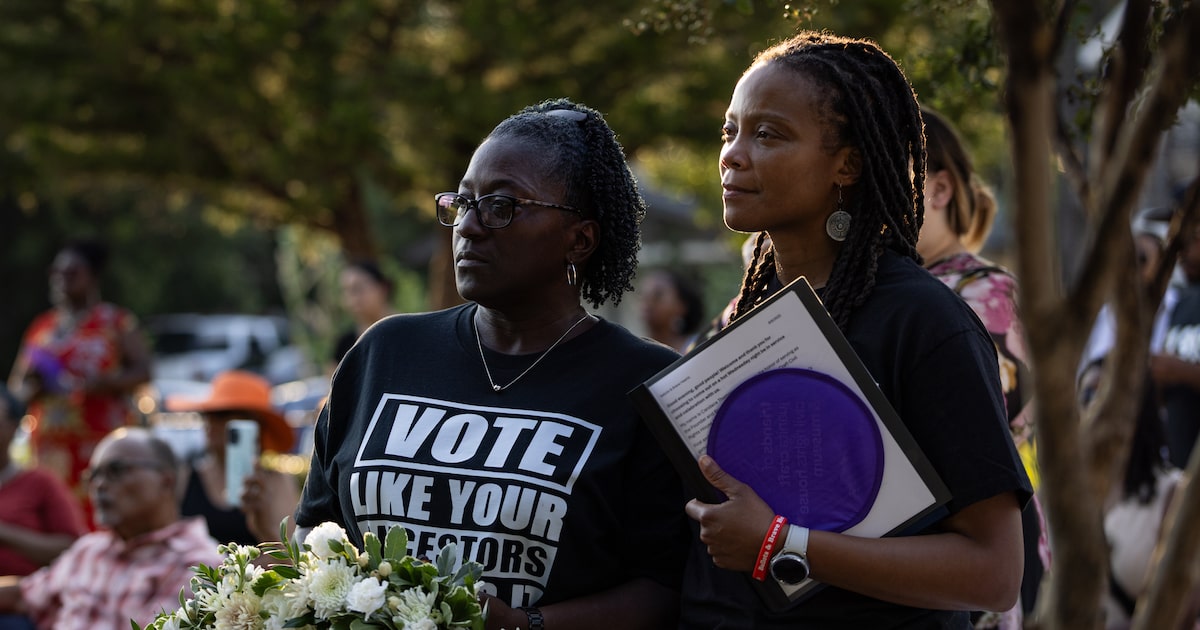In South Dallas, one house is sacred ground. It’s where the late civil rights icon Juanita Craft opened her home to serve as a nexus for the Civil Rights Movement, training future leaders and activists.
“It was a sanctuary where youth dared to dream, challenge the status quo, thought critically and organized for justice,” said Candace Thompson, founder and chair of nonprofit The Friends of Juanita Craft Civil Rights House and Museum. “Mrs. Craft gave us a blueprint and now it’s our turn to answer the call to rise, to act and to move with unwavering purpose.”
On Wednesday evening, Thompson was one of more than 50 people who paid homage to Craft’s legacy while also celebrating the Voting Rights Act. With both anniversaries falling on the same day, it has been 40 years since Craft died and 60 years since the Voting Rights Act was signed.
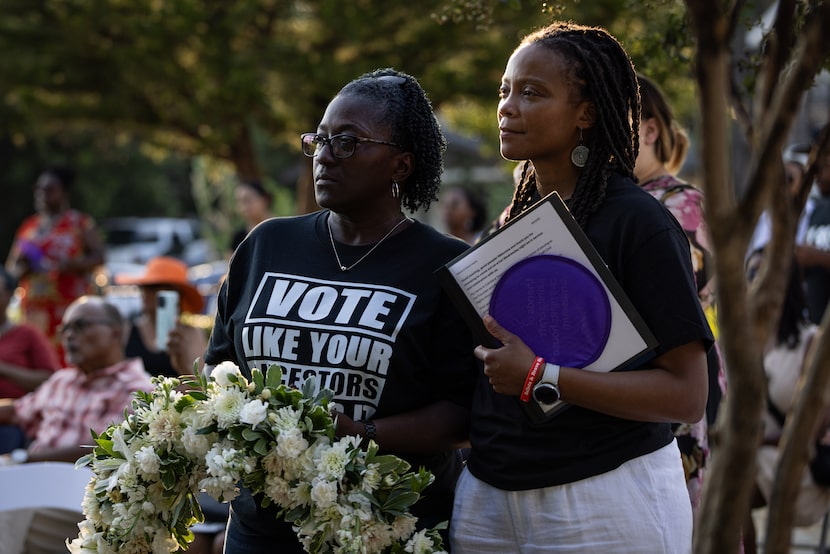
Juanita Davenport-Cook, Juanita Craft’s goddaughter, and Candace Thompson, founder and board chair of The Friends of Juanita Craft Civil Rights House & Museum, listened as a Craft relative spoke during an event on the 40th anniversary of civil rights leader’s death and the 60th anniversary of the Voting Rights Act at the museum on Wednesday, Aug. 6, 2025 in Dallas.
Angela Piazza / Staff Photographer
Breaking News
The gathering came amid a redistricting battle in the Texas Legislature and legal challenges to provisions of the Voting Rights Act, and on the same day, city leaders said they had paused policies and programs designed to promote diversity, equity and inclusion in an effort to comply with directives announced by President Donald Trump and retain millions in federal funding.
Opponents to the state’s mid-decade redistricting say the new proposals violate the Voting Rights Act because they dilute the voting power of communities of color.
Thompson called the current environment challenging.
Craft dedicated her life to ensuring the right to vote, Thompson said, and it’s important for people to understand what it took to get there.
“Voting is more than a right,” she said. “It is a sacred act of choice. In the face of systemic disenfranchisement, it remains a moral obligation. Our elders fought so we would not be denied a future shaped by our own hands.”
Juanita Craft’s legacy of civic action
The home on Warren Avenue now serves as a museum. In each room, the walls chronicle Craft’s busy life. She was born in 1902, the same year a state poll tax law was passed. She would go on to become the first Black woman to vote in a public election in Dallas County in 1944.
When she moved into her house in 1950, racial tensions were high. There were 11 bombings in the surrounding area between 1950 and 1951. In the ’50s, Craft led efforts to end segregation at the Texas State Fair. In 1963, she took dozens of students to the March on Washington.
Craft was also a leader in the NAACP, credited for organizing more than 180 chapters and youth councils. Her home drew visits from the Rev. Martin Luther King Jr., Lyndon B. Johnson, Thurgood Marshall and Eleanor Roosevelt. In 1975, then 73-year-old Craft was elected to the Dallas City Council and served a second term.
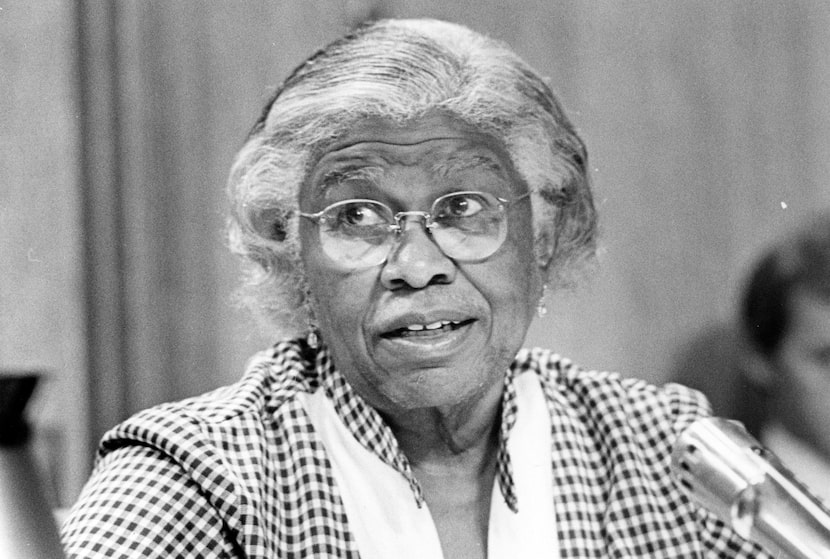
A September 1976 staff photo of Dallas City Council member Juanita Craft.
The Dallas Morning News
Thompson said Craft stood up for other groups, including the LGBT community, when it wasn’t popular, and left a legacy of persistence and understanding of a moral obligation to create change.
“She’s a visionary,” Thompson said. “She understood that she had a higher calling in the community. It wasn’t just about preservation of self.”
Shortly before her death in 1985, Craft is credited as saying, “It is my hope that after I am gone, people of all backgrounds will visit my house and come to understand that individuals can make a difference and to appreciate the importance of service to community and nation.
“You don’t have to be rich to make an impact, but you have to work and to care,” she said.
Voting rights concerns in the present
Forty years after Craft’s death — with the celebration put on by the city’s Office of Arts and Culture, Friends of Juanita Craft and the Junior League of Dallas — there were civil rights concerns of the present.
Traelon Rodgers, a Friends of Juanita Craft board member and an NAACP member, told the group how people of color had gained voting rights over time. He said the Voting Rights Act came after years of protesting and civil disobedience.
Now, he said the act had been whittled away over the past several decades, and that a new act must be passed to protect voter rights.
“The Voting Rights Act was intended to protect folks of color,” Rodgers said. “As we see now, there’s an attack on more than just people of color. There’s an attack on folks for their political beliefs, for their gender, for their ideology, for their religious beliefs and many other things.”
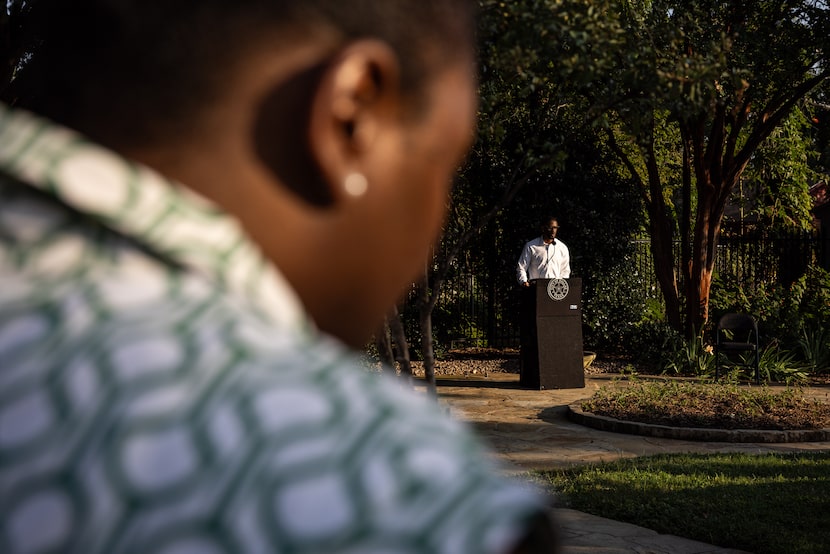
Traelon Rodgers, a civil rights lawyer, spoke at an event on the 40th anniversary of civil rights leader Juanita Craft’s death and the 60th anniversary of the Voting Rights Act at the Juanita J. Craft Civil Rights House & Museum on Wednesday, Aug. 6, 2025, in Dallas.
Angela Piazza / Staff Photographer
The U.S. Supreme Court will hear a Louisiana case that threatens to remove provisions of the Voting Rights Act that protect voters of color from being adversely impacted in redistricting plans.
In Texas, Gov. Greg Abbott ordered lawmakers into a special session to consider redrawing congressional district lines after the U.S. Department of Justice called the map unconstitutional because it was drawn with racial issues in mind.
Texas Republicans who drew the current map disagree, but maintain they have the right to redraw the lines when they want.
Republicans proposed a redistricting plan that targets five Democrat-controlled congressional seats. It would eliminate one seat each from Dallas-Fort Worth, Houston and the Austin/San Antonio area. In South Texas, two seats currently held by Democrats would be pushed toward stronger Republican majorities, based on 2024 election results.
The plan condenses some urban Democratic strongholds, and the result would leave just two majority Black districts in Texas. Supporters of the redistricting have said the decision is based on party affiliation and interest.
Tom Oliverson, chair of the Texas House Republican Caucus, was asked to respond to Democrats saying the proposed map would disenfranchise voters, especially those of color, in an interview with NPR’s All Things Considered.
“We heard this in one of the redistricting hearings, that a district that was less African-American would take a Democrat vote away,” Oliverson said. “And the reality is, is that African-Americans, as well as Hispanics, particularly in South Texas, have trended towards Republicans.”
In Dallas, the Juanita Craft and voting rights celebration was “timely,” said former council member and community advocate Diane Ragsdale, who drew parallels between previous struggles for voting rights and current efforts to redistrict the state.
“Voting rights were important yesterday, and it’s important today,” Ragsdale said. “What’s going on right now and in the Legislature is a move to violate our voting rights.”
Craft goes beyond civil rights
Ragsdale was a “Craft kid,” joining the NAACP youth council under Craft’s leadership when she was 11 years old. The NAACP didn’t just emphasize voting rights, but culture, and Craft provided a place for youth to go and receive love, Ragsdale said. She said Craft’s contributions to her community went beyond inspiring her activism.
“It was so very clear that Mrs. Craft was very much, so concerned about us,” she said. “She loved us, and that was important.”
Related:Dallas leaders, activists eager for rebirth of Juanita Craft Civil Rights House
Kendall Ferguson, the city’s community engagement coordinator for the house, said it’s rewarding to share Craft’s story, and she sees how visitors find inspiration in Craft.
“It’s just more about your purpose,” Ferguson said. “Mrs. Craft said that she was an ordinary woman that did extraordinary things, and we all have the ability to do these great things.”
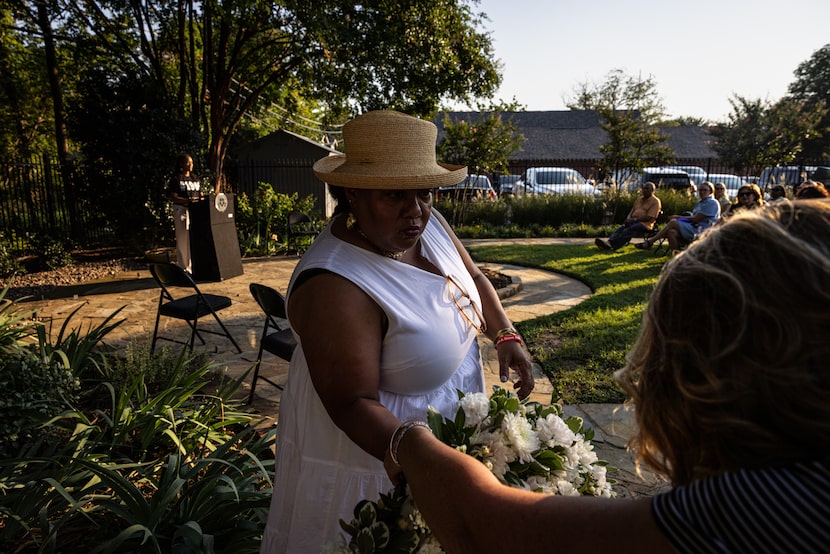
“Mrs. Craft said that she was an ordinary woman that did extraordinary things, and we all have the ability to do these great things,”said Kendall Ferguson, community engagement coordinator with Juanita Craft House and the city of Dallas. Ferguson was handed a wreath during an event on the 40th anniversary of the civil rights leader’s death and the 60th anniversary of the Voting Rights Act at the Juanita J. Craft Civil Rights House & Museum on Wednesday, Aug. 6, 2025, in Dallas.
Angela Piazza / Staff Photographer
For Craft’s goddaughter and namesake, Juanita Jewel Davenport-Cook, Craft was about teaching life lessons. Davenport-Cook said her parents met in the youth council.
Craft didn’t have biological children of her own, and so, she became Davenport-Cook’s godmother.
“You know how people say ‘the sky’s the limit,’” Davenport-Cook asked. “She was like, ‘No … Men went to the moon, so that’s beyond the sky.”
This reporting is part of the Future of North Texas, a community-funded journalism initiative supported by the Commit Partnership, Communities Foundation of Texas, The Dallas Foundation, the Dallas Mavericks, the Dallas Regional Chamber, Deedie Rose, the McCune-Losinger Family Fund, The Meadows Foundation, the Perot Foundation, the United Way of Metropolitan Dallas and the University of Texas at Dallas. The News retains full editorial control of this coverage.
